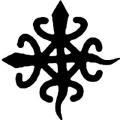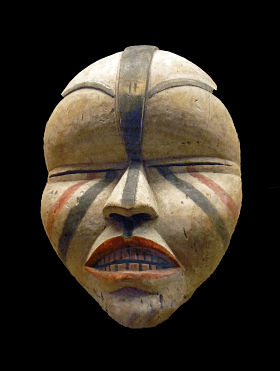19. Behind the Mask: African Philosophy of the Person
Traditional African ideas about personhood, which challenge assumptions about the relation between mind and body, self and other.
Themes:
• P.H. Coetzee and A.P.J. Roux, The African Philosophy Reader (London: 2003), ch. 3.
• K. Gyekye, “The Akan Concept of a Person,” in R.A. Wright (ed.), African Philosophy: an Introduction (Lanham: 1984), 199-212.
• K. Gyekye, An Essay on African Philosophical Thought: the Akan Conceptual Scheme (Philadelphia: 1987).
• E.L. Mendosa, “The Journey of the Soul in Sisala Cosmology,” Journal of Religion in Africa 7 (1975), 62-70.
• T. Perman, “Awakening Spirits: The Ontology of Spirit, Self, and Society in Ndau Spirit Possession Practices in Zimbabwe,” Journal of Religion in Africa 41 (2011), 59-92.
• K. Wiredu, “The Akan Concept of Mind,” Ibadan Journal of Humanistic Studies 3 (1983), 113-34. Reprinted in G. Floistad (ed.), Contemporary Philosophy, Vol. 5, African Philosophy (Netherlands: 1987).
• K. Wiredu and K. Gyekye (eds), Person and Community (Washington DC: 2010).
Stanford Encyclopedia: Akan Philosophy of the Person







Comments
Distinction between material and spiritual
Around the 7th minute, you speak of a controversy about which parts of the person in Akan philosophy are "material" or "physical" and which are more "spiritual". But don't precisely these Akan ideas show that this distinction makes no sense here? I am especially thinking about the argument that "spiritual mediums" can in some sense see the sumsum, and that it must therefore be material. As you pointed out in the podcast, this is a rather weird way of reasoning.
I tend to believe this is a purely European distinction, which probably comes from platonism (or perhaps older Greek philosophy or religion). Is there anything similar in non-European philosophy?
In reply to Distinction between material and spiritual by S.G.
Material vs spiritual
Yes, that's a nice point and rather what we were driving at in the episode though we didn't come out and put it that strongly. Obviously the contrast between material and immaterial beings is indeed a striking feature of Western thought going back to Plato; it's an interesting hypothesis that we get this contrast less in non-Western philosophies. I tend to think though that it does play a role in Indian thought, if not perhaps in quite the same way - a tradition like Vedanta does remind one of (Neo)Platonism, and Samkhya also looks pretty dualist, though now that you have posed the question I'm wondering whether I was seeing those schools through Platonist eyes while reading about them.
In reply to Distinction between material and spiritual by S.G.
Indian dualism
Indian dualism is different though, I wouldn't say it makes a distinction between mind and matter. The distinction of prakrit/purisha seems more like a distinction between a subject and the objects but the objects include mental states and spiritual realities as part of the "furniture of the world" so to speak. I would say that is the subject, the observer, Brahman, who looks through all of us and there are the objects that he observes, somewhat more like Hegel distinction between consciousness-in-itself and consciousness-for-itself.
In reply to Distinction between material and spiritual by S.G.
In other words
In other words I don't think Indian idealism necessarily involves the idea of matter. The sanskrit word that is usually translated as matter is "rupa" wich means something more like "form". So "Rupa" is everything that has a form, that is manifested be it in the mind of through the senses, also, a lot of times you head the mind as been posit as a sixth sense who recieves objects of cognition, thoughts, feelings, perceptions, etc, as if they were features of the world. What makes sense with the whole theory of rebirth, as constiousness is entangled and identifying and bonding with the transient objects of perception it takes many forms. Also, the spiritual world's are just as material/imaterial as ours, what determines if you're going to experience one or another is karma that is bonding your soul, and moksha as consciousness identify with itself as an empty, formless, transcendental existence, stoping the identification and then the coming to be.
In reply to In other words by Gabriel
Matter
Yes that seems right. The Indian tradition of course does have theories of matter, like atomism, but the idealist strand isn't rejecting the reality of matter but of the whole phenomenal realm, so in Aristotelian terms what we might call the realm of matter+form. I like your suggestion of thinking about it more in terms of the subject-object contrast.
In reply to Matter by Peter Adamson
I meant dualism, also live your bro, keep up the good work
I love your work btw, have listen to the whole thing up to now. The main series, India and now Africa, I'm really ansious for China.
I said idealism but I meant dualism (It was too late at night, I think), though what I said apply to both. Dualism is more about dualism between subject and objects (including mental states) than dualism of matter/spirit, there are materialist schools though as you said with atomism. But if I'm not mistaken I think even the different atoms of the elements have mental qualities associated with then in most schools (except the Charvakas, we don't know much about them unfortunately).
The person in Zimbabwe
I'm so late to the party I'm not sure you'll see this but I really enjoyed your overview of Akan and Yoruba approaches to the person here. I am also humbled that you addressed my work on the centrality of the spirit to Ndau ideas of the self. If any of your listeners are interested in a Zimbabwean take on African (or Afrikan) personhood from the perspective of a local thinker, I would recommend Mandivamba Rukuni's book "Being Afrikan." He writes specifically for "Africans in Africa" as opposed to a lot of the work cited here (like my own) that is directed more to the academic community. I suppose one question I have, if you're still worked through African attitudes and approaches to personhood, is why characterize these as precolonial? Although their roots obviously predate imperialism, they remain vibrant today. The spirits are not anachronisms. Anyway, wonderful work. I look forward to hearing more.
In reply to The person in Zimbabwe by Tony Perman
Personhood
Wow, it is exciting to hear from you! Glad that you feel we did the topic justice.
You're right about "Precolonial," the reason we label it like that is just to distinguish it from the other parts of the series. Technically this part is about "traditions that stretch back to before colonial times" so "Precolonial" is just shorthand for that. But it should be pretty clear from our coverage that we are talking about living traditions (otherwise they could not have been studied!).
Add new comment